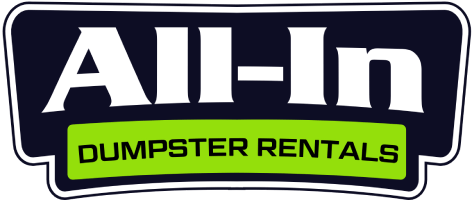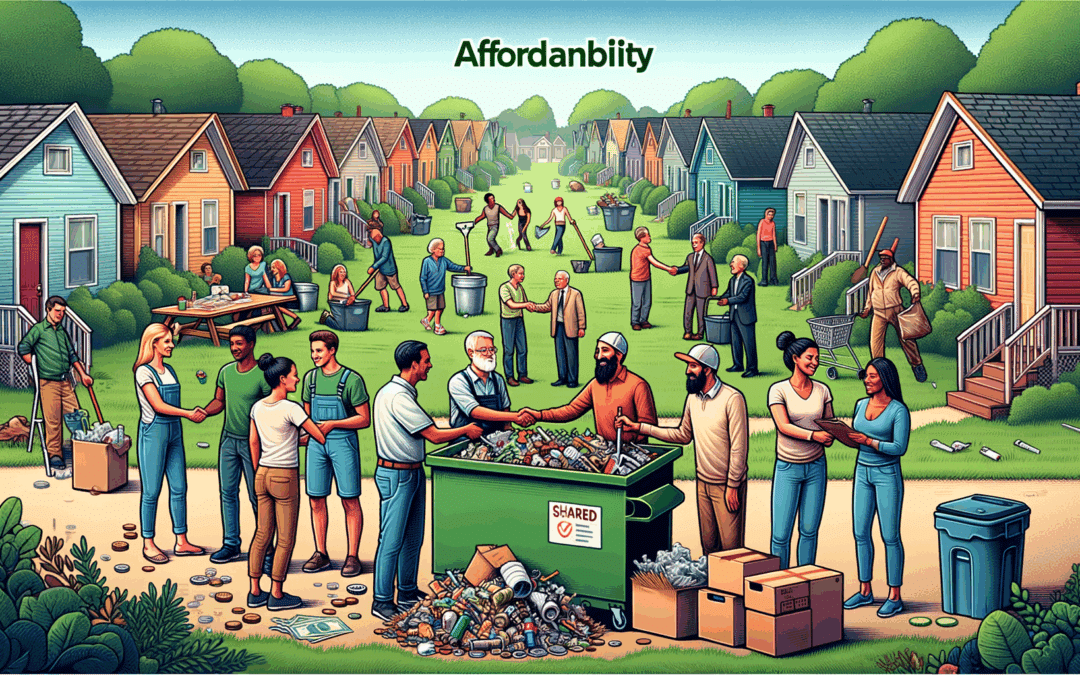Living in Western North Carolina means experiencing the natural beauty that surrounds us every day. From the vibrant fall colors to the lush summer greenery, Asheville and its surrounding communities are blessed with stunning landscapes that deserve our protection. But what happens when your neighborhood needs a major cleanup? Maybe it’s after a storm, during spring cleaning season, or for an organized community beautification project. The waste generated can be substantial, and hiring individual dumpsters for each home quickly becomes costly.
Here in Asheville, we’ve noticed a growing trend among homeowners: sharing dumpster costs with neighbors for community cleanup projects. As a local, family-owned dumpster rental company serving Buncombe, Henderson, Haywood, and Madison counties, we’ve helped numerous neighborhood groups coordinate shared dumpster rentals that save money while bringing communities closer together.
The Blue Ridge Mountains inspire collaboration by their very nature, and we’ve seen this community spirit reflected in how Asheville residents approach waste management. From historic neighborhoods like Montford to newer developments in South Asheville, neighbors are discovering that working together not only reduces costs but strengthens community bonds. Let’s explore how you can organize a shared dumpster rental that works for everyone involved.
Why Share a Dumpster with Neighbors?
Before diving into the how-to aspects, let’s consider the benefits of sharing dumpster costs with neighbors:
Significant Cost Savings: Perhaps the most obvious advantage is financial. When five or six households split the cost of one dumpster, each participant pays a fraction of what they would for individual waste removal services.
Environmental Benefits: Consolidating neighborhood waste into a single dumpster means fewer truck trips through your community, reducing emissions and noise pollution. It’s an eco-friendly approach that aligns with Asheville’s sustainability values.
Community Building: Shared cleanup projects naturally bring neighbors together. We’ve seen strangers become friends while working side by side to improve their shared spaces. In today’s often disconnected world, these interactions are incredibly valuable.
More Efficient Use of Resources: Many households don’t generate enough waste to fill an entire dumpster by themselves, especially our larger 13-yard and 15-yard options. Sharing eliminates waste of both space and money.
Planning Your Shared Dumpster Rental
Successful community cleanups require thoughtful planning. Here’s how to organize a shared dumpster experience that runs smoothly:
Gauge Interest and Identify Participants
Start by talking with your immediate neighbors about the idea. A simple conversation over the fence or a post on your neighborhood social media group can help identify interested parties. In Asheville’s close-knit communities, you’ll likely find others who have been considering similar projects.
When approaching neighbors, be specific about your cleanup goals. Are you focusing on yard waste after a storm? Planning a collective garage cleanout? Or preparing for a neighborhood beautification project? Having a clear purpose helps neighbors decide if the project aligns with their needs.
Estimating the Right Dumpster Size
One common question we receive from Asheville residents planning community cleanups is: “How do we know what size dumpster we need?” The answer depends on several factors:
Number of Participating Households: As a general guideline, for 2-3 homes, our 10-yard dumpster often suffices for general cleanouts. For 4-6 homes, consider our 13-yard or 15-yard options.
Type of Waste: Different materials fill space differently. Yard waste like leaves and branches can be compacted, while bulky furniture items quickly consume dumpster capacity. When Asheville residents call us about community cleanups, we ask detailed questions about the waste types to recommend the appropriate size.
Project Duration: For weekend neighborhood cleanups, a single dumpster might be perfect. For extended projects spanning a week or more, you might need multiple dumpsters or scheduled swap-outs.
For context, our 15-yard dumpster can typically handle the equivalent of about 4-5 pickup truck loads. This has proven ideal for many neighborhood cleanup projects throughout the Asheville area.
Creating a Fair Cost-Sharing Structure
Clear financial arrangements prevent misunderstandings and ensure everyone feels the arrangement is equitable. Here are approaches that have worked well for other Asheville neighborhoods:
Equal Splits: The simplest approach divides the total cost evenly among participating households. For example, if the dumpster rental costs $350, and five neighbors are participating, each contributes $70.
Usage-Based Contributions: Some neighbors prefer to contribute based on their anticipated usage. A family doing a major garage cleanout might contribute more than someone with just a few items.
Handling Additional Fees: Be sure to discuss how potential overage charges will be handled. Weight limits matter, especially when multiple households contribute. We’re always transparent about our weight allowances and overage fees, but it’s important that all participants understand these potential additional costs.
Designated Money Handler: Appoint one trusted neighbor to collect contributions and handle payment. This simplifies the transaction and gives everyone a single point of contact for financial questions.
Coordinating Dumpster Placement and Access
The physical location of the shared dumpster requires thoughtful consideration:
Central Placement: Ideally, position the dumpster in a spot that’s equally accessible to all participating neighbors. In Asheville’s sometimes hilly neighborhoods, this might mean choosing a relatively flat street location rather than a steep driveway.
Permission Considerations: If you’re placing the dumpster on a shared driveway or common area, ensure you have proper permission from any homeowners association or property management company. For street placement in Asheville, check local regulations—some neighborhoods may require permits.
Surface Protection: We always use wood blocks under our dumpsters to protect driveways and surfaces, but additional protection may be needed for decorative or sensitive surfaces.
Access Schedule: For multi-day rentals, consider creating a loose schedule so neighbors know when they can add their items without overcrowding the area. Morning and evening time slots often work well around work schedules.
Setting Clear Guidelines for Participants
Establishing ground rules helps prevent conflicts and ensures proper dumpster use:
Prohibited Items: Make sure all participants understand what cannot go in the dumpster. Remind everyone that hazardous materials (paint, chemicals, electronics), tires, and certain appliances are prohibited by regulations in Western North Carolina.
Space Utilization: Encourage everyone to break down larger items and flatten boxes to maximize space. Loading techniques matter—heavier items should go in first, with lighter materials on top.
Fill Level Limits: Our dumpsters cannot be filled beyond the top rail for safe transport. All participants should understand this limitation to avoid overfilling issues.
Community-Only Rule: Unfortunately, an unattended dumpster sometimes attracts unauthorized dumping from non-participants. Consider covering the dumpster overnight or posting a simple sign indicating it’s for specific residences only.
Making It a Community Event
The most successful neighborhood cleanups we’ve seen around Asheville turn waste management into community building:
Designated Cleanup Day: Setting a specific date when everyone participates creates momentum and a sense of shared purpose. Many Asheville neighborhoods choose Saturday mornings, followed by a community cookout or potluck.
Skill Sharing: Neighbors often have complementary skills and resources. One might have a pickup truck to help move heavier items, while another might be skilled at dismantling furniture to save space.
Photography and Celebration: Document your community’s transformation with before-and-after photos. Seeing the collective impact reinforces the value of working together.
Future Planning: Use this opportunity to discuss other community projects or schedule regular cleanup events. Many neighborhoods in Western North Carolina now organize seasonal cleanups that residents look forward to.
Real Examples from Asheville Communities
We’ve witnessed some inspiring shared dumpster successes throughout our service area:
In a West Asheville neighborhood last spring, twelve households collaborated on a shared 15-yard dumpster for a weekend cleanup, transforming their street while saving each family over $200 compared to individual junk removal services. They organized a system where each family had a two-hour window to bring their items, preventing overcrowding.
After last year’s heavy summer storms, a group of neighbors in Fletcher shared two dumpsters for yard debris removal, rotating the placement between driveways to ensure fair access for everyone. They created a simple spreadsheet to track contributions and usage.
A Hendersonville condo community organized a quarterly “clean sweep” event where residents share dumpster costs while helping elderly neighbors with their heavy lifting. What began as cost-saving has become a cherished community tradition.
Handling Potential Challenges
Even with careful planning, shared projects sometimes face hurdles:
Unequal Participation: Sometimes certain households contribute significantly more waste than others. Addressing this upfront with either usage-based pricing or clear limits helps maintain harmony.
Schedule Conflicts: Not everyone can participate on the same day. Consider extending the rental period to accommodate various schedules, even if it means a slightly higher overall cost.
Weather Disruptions: Asheville’s mountain weather can be unpredictable. Have a contingency plan for rain dates, especially for outdoor cleanup projects.
Communication Breakdowns: Create a group text, email chain, or social media group specifically for the cleanup project to keep everyone informed about timing, guidelines, and any changes.
Beyond the Cleanup: Sustaining Community Connection
The relationships built during shared cleanup projects often extend beyond waste management:
Many neighborhoods find that after successfully sharing a dumpster, they’re inspired to collaborate on other community improvements—from neighborhood gardens to tool-sharing programs. The trust and communication channels established make future projects easier to organize.
Some communities have used their initial cleanup as a springboard for more structured neighborhood associations that address ongoing needs and opportunities. Others keep it simple with informal seasonal cleanup traditions.
Here in Asheville, where community and environmental values run deep, these collaborations reflect our shared commitment to maintaining the beauty of our mountain home while strengthening the connections between neighbors.
Ready to organize your neighborhood’s shared dumpster rental? We’re happy to help with sizing recommendations, placement strategies, and scheduling that works for your community’s unique needs. Our experience throughout Western North Carolina has shown us that when neighbors work together, everyone benefits—both through cost savings and stronger community bonds.
Whether you’re planning a post-winter cleanup in Weaverville, a summer community project in Candler, or a fall yard clearing in Arden, sharing resources makes perfect sense. Just like the interconnected ecosystem of our beautiful Blue Ridge Mountains, our communities thrive when we collaborate rather than go it alone.

